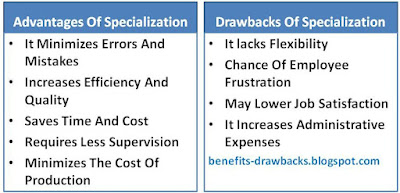What Is Specialization ?
Specialization is a process of breaking down the jobs into smaller units. The task is divided among the people according to their ability. Employees become perfect in the specific field because they have to perform same task over and over. It practices division of labor where a complex task is divided into different pieces of jobs and assigned to different staffs. It helps to increase the performance and productivity of the organization.
Benefits Or Advantages Of Specialization
The main advantages of specialization can be pointed out as follows:
1. It Increases The Efficiency
In specialization, jobs and duties are divided among the employees according to their skills and abilities. It promotes the principle of 'right man in right place' which helps to improve the efficiency and performance in the workplace.
2. Less Errors And Mistakes
Specialization helps to reduce errors and mistakes because tasks are assigned to highly qualified and professional employees having good skills and experience. Specialist workers commit less mistakes and errors than non-skilled ones.
3. Time Saving
Employees have to do same type of job regularly over and over which helps to boost the speed in their performance. So, they can perform more tasks in less time than non-specialized manpower.
4. It Saves Costs
Increased efficiency, less mistakes and quick performance increases the productivity of the business. Specialization also lowers the wastage and unnecessary costs which helps to minimize the cost of production and increase the earning of the firm.
5. Less Supervision and Control
As we know that specialization believes in the principle of 'right man for right job'. it hires highly competent and self-motivated employees. So, it requires less supervision, direction and control to perform activities.
Drawbacks Or Disadvantages Of Specialization
The main disadvantages of specialization can be highlighted as follows:
1. Monotonous Work
Because of the repetition of job or doing a certain type of job everyday may lead to monotony. Employees may feel frustrated and stressed. So, monotony of work may lead to decrease the performance and productivity.
Also Read:
Advantages Of Division Of Labor
Disadvantages Of Division Of Labor
2. Increased Expenses
Skilled employees may demand high salary and other financial benefits as compared to un-skilled workers. So, it may increase administrative expenses in the organization.
3. It Lacks Flexibility
A specific type of work is assigned to each employee. He/she cannot perform other types of jobs because of the lack of skills and abilities. So, employees cannot be shifted or transferred to other departments or units. So, there is less employees mobility or flexibility in the work station.
4. Lower Job Satisfaction
Because of monotonous, stress and frustration, the job may become boring. Employees cannot get the opportunity to learn new skills to perform other tasks. So, there is no scope for career development. So, specialization may decrease the interest in the job which may lead to decrease in employee satisfaction.
Pros:
- It helps to minimize errors and mistakes while performing the job
- It increases the quality of output
- It helps to increase the productivity that leads to increase in the earning of the firm
- Because of the increase in efficiency, it saves time and cost of production
- It sharpens the specific skill of employees
Cons:
- Employees may feel boring because of the repetition of the same job over and over
- There will be no flexibility in the workplace because employee hired for specific job cannot be shifted or transferred to another job
- High possibility of employee frustration and stress
- It may decrease employee satisfaction
- It increases the expenses due to the high salary of skilled employees





